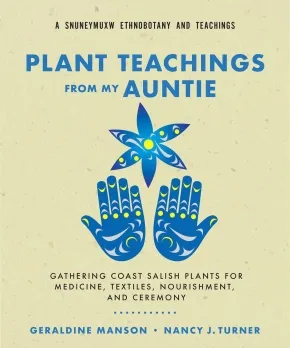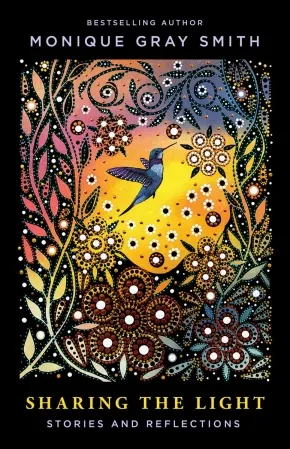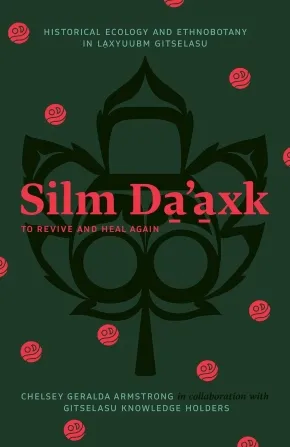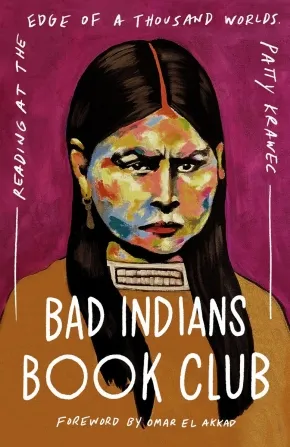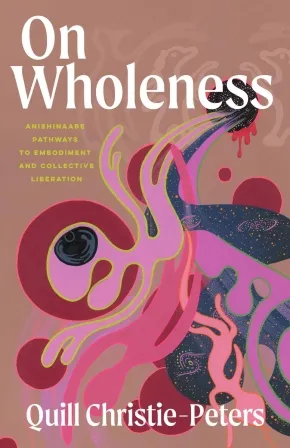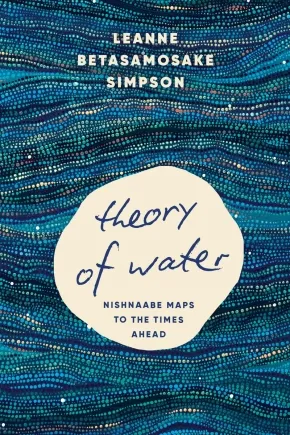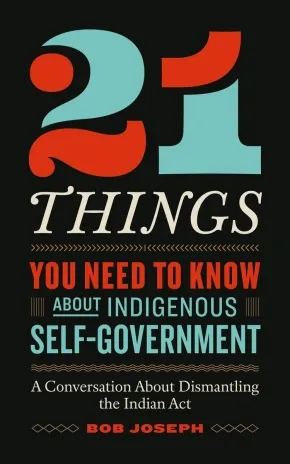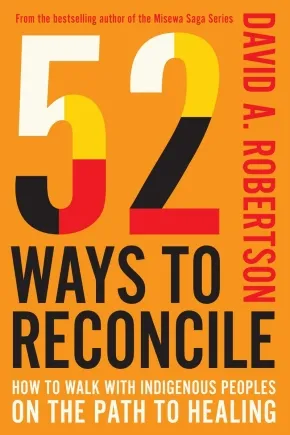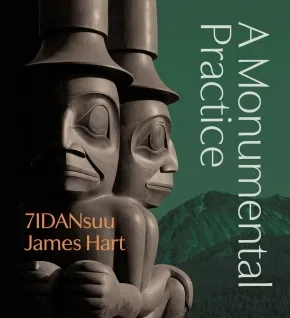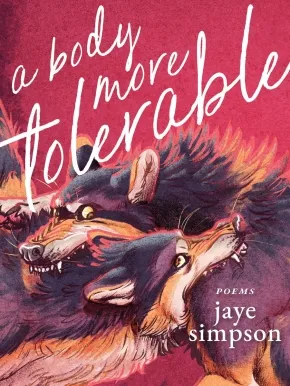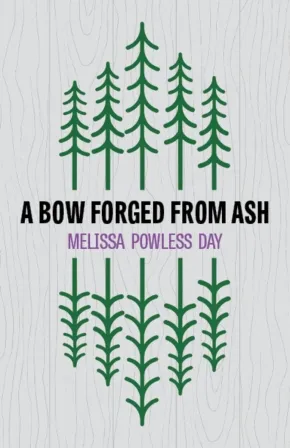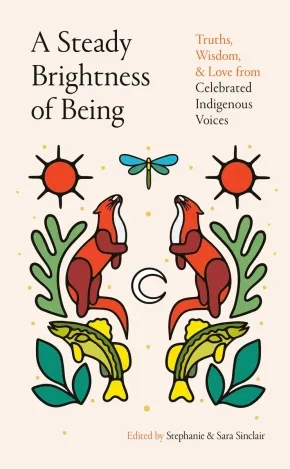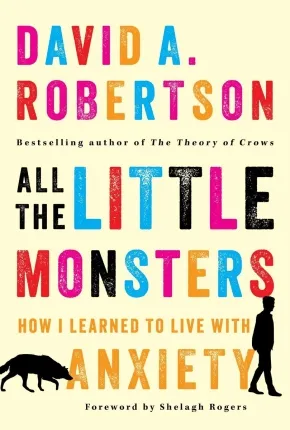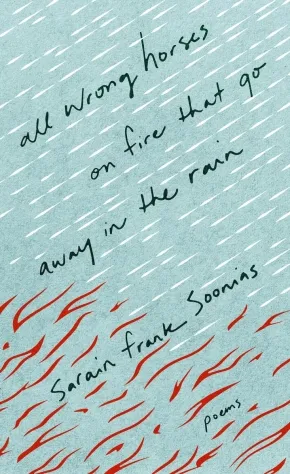First Nations
Synopsis:
A Snuneymuxw ethnobotany guide grounded in Indigenous knowledge and deep ancestral connection to the land.
Plant Teachings from My Auntie: Gathering Coast Salish Plants for Medicine, Textiles, Nourishment, and Ceremony is a richly illustrated compendium of the many culturally significant wild foods and herbal remedies found in the traditional territory of the Snuneymuxw First Nation.
Each entry features plant descriptions complete with both their Hul'q'umi'num and botanical names, typical native habitat, and traditional uses. Particular attention is paid to the sacred Western Red Cedar or "tree of life." The book also offers a selection of healing recipes; tips for respectful, sustainable harvesting; ethical and responsible preparation techniques; and a guide to local gathering sites.
Snu'y'ulh refers to teachings handed down through generations. Snuneymuxw Elder and Knowledge Keeper Geraldine Manson, whose traditional name is C'tasi:a, draws on the sacred knowledge passed on to her by her "Auntie Ellen," Dr. Ellen White, also known as Kwulasulwut. Central to these learnings is the fundamental concept or protocol of honoring gifts from the land by gathering and preparing in ways that respect the history, culture, spirituality, and Indigenous knowledge associated with each species.
This powerful work is a rare treasure that will appeal to those seeking to foster greater cultural understanding and ecological responsibility while deepening their commitment to meaningful reconciliation.
Additional Information
96 pages | 9.00" x 7.50" | Paperback
Synopsis:
Uplifting stories, vignettes, and reflections to inspire gratitude, love, joy, and hope in navigating life in a changing, challenging world.
This beautiful and welcoming book can be read cover to cover or used as a daily source of guidance, providing gentle wisdom that inspires and empowers. Through the lens of five transformative practices - gratitude, love, joy, happiness, and hope - bestselling author Monique Gray Smith weaves together short stories, poignant reflections, and thoughtful questions that invite readers to pause and reconnect with their inner light. And as an Indigenous author, Monique brings her cultural wisdom and unique perspective to each offering.
Sharing the Light is a powerful reminder that when we embrace our light and share it with the world, that energy not only transforms us but ripples out to uplift everyone around us.
Additional Information
208 pages | 5.00" x 7.75" | Hardcover
Synopsis:
The history and ecology of the Skeena River region in the Pacific Northwest is characterized by a complex landscape of interwoven phenomena, driven by biophysical and cultural changes over millennia. Combining archaeological, botanical, and historical research, together with first-hand accounts provided by Gitselasu knowledge holders, this book critically assesses and debunks settler colonial narratives of a wild and untouched landscape in northwestern British Columbia. By focusing on people-plant interactions and landscape changes through time, Silm Da’axk offers insights into the diverse and bustling territories of Gitselasu Ts’msyen. Augmenting these discussions is a vividly illustrated guide to the plants that grow in the region.
From the middle Skeena River to the coast, along creek beds and into alpine meadows, Gitselasu continue to thrive, representing one of the oldest and longest enduring Ts’msyen Nations. Tapping into historical knowledge of the laws (adawx) surrounding plant use and territory ownership, this book highlights the intricate relationships that exist among people, places, and plants.
Educator Information
Gitselasu Knowledge Holders include the many teachers and Elders who contributed to this book, including Wilfred Bennett, Amy Bevan, Mel Bevan, Geneva Mason, Alfie McDames, Isabelle McKee, CJ Nabess, Pat Squires, and countless others. This collaboration was guided by the Kitselas Lands and Resource Department, stewards of Gitselasu lands and waters.
Subjects: Archaeology, Canadian History, Indigenous History, Geography and Landscape, Indigenous Studies.
Additional Information
376 pages | 5.50" x 8.50" | 80 colour illustrations | Paperback
Synopsis:
In this powerful reframing of the stories that make us, Anishinaabe writer Patty Krawec leads us into the borderlands to ask: What worlds do books written by marginalized people describe and invite us to inhabit?
Patty Krawec doesn’t want to be a “Good Indian.” When a friend asked what books could help them understand Indigenous lives, Patty Krawec gave them a list. This list then exploded into a book club, then into a podcast about a year of Indigenous reading, and then, ultimately, into this book.
Drawing on conversations with readers and authors, Bad Indians Book Club delves into writing about history, science, and gender, and into memoirs and fiction, all by “Bad Indians” and those like them, whose refusal of the dominant narrative of the wemitigoozhiwag (European settlers) opens up new possibilities for identity and existence.
Introducing each chapter with flash fiction about a shapeshifting Deer Woman, who is on her own journey to decide who she is, Krawec leads us into a place of wisdom and medicine where stories of and by marginalized writers help us imagine a thousand worlds waiting to be born.
Reviews
“Bad Indians Book Club is a compendium of worlds. From a lifetime of reading, there emerges a marriage of tapestry and map, a vision of the literary canon not as some secret handshake of the correctly educated but as a living, growing organism. . . There’s a dangerousness to a book like this. It’s not enough to define the Good Indian, the Grateful Immigrant, the Untroublesome Minority. Nor is it enough to simply reject these designations. One must interrogate how they came to hold so much power, how they offer the willing participant so many crumbs of reward from colonialism’s table.”— Omar El Akkad, author of One Day, Everyone Will Have Always Been Against This, September 2025
“Bad Indians Book Club is like a kind and protective auntie guiding you through a sometimes hostile world with sheer wisdom and wit. It’s a resounding rallying cry for our stories and our peoples. There’s no other book club I’d want to be in!”— Waubgeshig Rice, author of Moon of the Turning Leaves, September 2025
“This genre-crossing, shape-shifting, imagination-expanding book is for all who love to, and also need to, read. We tell stories to live, and this enlivening book reflects on all kinds of stories, each page suffused with Patty Krawec’s unmistakable voice and generous, timeless wisdom.”— Astra Taylor, author of The Age of Insecurity: Coming Together as Things Fall Apart, September 2025
“I didn’t want the Bad Indians Book Club to end. I read it at the perfect time, when snow was on the ground, in a period of rest and renewal. Patty Krawec made me wonder and made me ponder. Her book is a call to action to be curious, vigilant, to listen to and receive the inner strength of the land, to create and recreate community, to agitate, to investigate, to take story into ourselves and to hold the teachings sacred. As she guides us, throughout the book she tells us a new, sustaining, serial story about Kwe, Deer Woman. Such a gift. There is so much goodness in The Bad Indians Book Club!”— Shelagh Rogers, Shelagh Rogers, Truth and Reconciliaton Commission Honorary Witness, recovering broadcast journalist, September 2025
“Bad Indians Book Club is full of good medicine — challenging us to ask questions and bringing us home to ourselves. As Patty Krawec guides us into the deep wisdom wells of many people who journey in kinship, we consider how to hold the curiosity of care and stories, and what it means to imagine and create a future that integrates all our stories into a web of healing. Please buy this book, and celebrate the power of story in a weary yet flourishing world.”— Kaitlin B. Curtice, author of Living Resistance, September 2025
“In Bad Indians Book Club, Patty Krawec provides critical space for the ne'er-do-wells, disrupters, red sheep, box-busters, tricksters, and all us rowdy relatives defying expectations. Indigenous people have always been proverbial thorns in the sides of colonizers, and this piercing book does an incredible job of letting the air out of today’s imperialist narratives.”— Taté Walker, Two Spirit Lakota storyteller and community-builder, September 2025
“With Bad Indians Book Club, Patty Krawec gifts us a compelling investigation into the power of not just reading books but also doing so in community. Krawec makes the case for building your circle through reading, as a way of being in better relations with all our kin, including the land. Thinking deeply alongside other books, Bad Indians Book Club is a needed guide at a moment when books are under attack. Books are not just written culture, they are also oral culture, and Krawec illuminates this beautifully.”— Chanda Prescod-Weinstein, author of The Disordered Cosmo, September 2025
Additional Information
232 pages | 6.00" x 9.00" | Paperback
Synopsis:
The groundbreaking Indigenous style guide every writer needs.
The first published guide to common questions and issues of Indigenous style and process for those who work in words and other media is back in an updated new edition. This trusted resource offers crucial guidance to anyone who works in words or other media on how to work accurately, collaboratively, and ethically on projects involving Indigenous Peoples.
Editor Warren Cariou (Métis) and contributing editors Jordan Abel (Nisga’a), Lorena Fontaine (Cree-Anishinaabe), and Deanna Reder (Cree-Métis) continue the conversation started by the late Gregory Younging in his foundational first edition. This second conversation reflects changes in the publishing industry, Indigenous-led best practices, and society at large, including new chapters on author-editor relationships, identity and community affiliation, Two-Spirit and Indigiqueer identities, sensitivity reading, emerging issues in the digital world, and more.
This guide features:
- Twenty-two succinct style principles.
- Advice on culturally appropriate publishing practices, including how to collaborate with Indigenous Peoples, when and how to seek the advice of Elders, and how to respect Indigenous Oral Traditions and Traditional Knowledge.
- Terminology to use and to avoid.
- Advice on specific editing issues, such as biased language, capitalization, citation, accurately representing Indigenous languages, and quoting from historical sources and archives.
- Examples of projects that illustrate best practices.
Additional Information
208 pages | 5.50" x 7.50" | Paperback
Synopsis:
A brilliant exploration of the body as a site of settler colonial impact, centring embodied wholeness as a pathway to our collective liberation.
This fierce and enlightening book reimagines the way we understand settler colonialism-through the body itself. Anishinaabeg visual artist Quill Christie-Peters takes us on a journey that begins before birth, in a realm where ancestors and spirits swirl like smoke in the great beyond. But once we enter the world, our bodies are shaped and scarred by colonial forces.
In poetic and raw storytelling, Quill shares her own experiences of gendered violence and her father's survival of residential school, revealing how colonialism disconnects us from ourselves. Yet, through an Anishinaabeg lens, the body is more than just flesh-it extends to ancestors, homelands, spirit relations, and animal kin.
Through reflections on childbirth, parenting, creative practice, and expansive responsibility as pathways to wholeness, Quill explores how reconnecting with the body can be an act of resistance and healing. She shows that wholeness-despite pain and displacement-is not just possible but essential for liberation, not only for Indigenous people but for all of us.
Additional Information
288 pages | 5.50" x 8.50" | Paperback
Synopsis:
Acclaimed Nishnaabeg writer Leanne Betasamosake Simpson takes a revolutionary look at that most elemental force, water, and suggests a powerful path for the future.
A genre-bending exploration of that most elemental force-water-through Indigenous storytelling, personal memory, and the work of influential artists and writers.
For many years, Leanne Betasamosake Simpson took solace in skiing--in all kinds of weather, on all kinds of snow across all kinds of terrain, often following the trail beside a beloved creek near her home. Recently, as she skied on this path against the backdrop of uncertainty, environmental devastation, rising authoritarianism and ongoing social injustice, her mind turned to the water in the creek and an elemental question: What might it mean to truly listen to water? To know water? To exist with and alongside water?
So began a quest to understand her people's historical, cultural, and ongoing interactions with water in all its forms (ice, snow, rain, perspiration, breath). Pulling together these threads, Leanne began to see how a "Theory of Water" might suggest a radical rethinking of relationships between beings and forces in the world today. In this inventive work, Simpson draws on Nishnaabeg origin stories while artfully weaving the work of influential writers and artists alongside her personal memories and experience--and in doing so, reimagines water as a catalyst for radical transformation, capable of birthing a new world.
Theory of Water is a resonant exploration of an intricate, multi-layered relationship with the most abundant element on our planet--one that, as Simpson eloquently shows, is shaping our present even as it demands a radical rethinking of how we might achieve a just future.
Additional Information
224 pages | 5.50" x 8.25" | Hardcover
Synopsis:
From the bestselling author of 21 Things™ You May Not Know About the Indian Act comes a powerful new book on dismantling the Indian Act and advancing Indigenous self-governance.
Bob Joseph’s 21 Things™You May Not Know About the Indian Act captured the attention of hundreds of thousands of Canadians by shining a light on the Indian Act and the problems associated with it. In that book, readers learned that the Consolidated Indian Act of 1876 has controlled the lives of Indigenous Peoples in Canada for generations, and despite its objective to assimilate Indians into the economic and political mainstream, it has had the opposite effect: segregation. They live under different laws and on different lands.
People came away from that book with questions such as "Can we get rid of the Indian Act?" and "What would that look like? Would self-government work?" These are timely questions, given that 2026 will mark 150 years since the Consolidated Indian Act of 1876. The short answer to these questions is, yes, we can dismantle the Act, and there are current examples of self-government arrangements that are working.
With his trademark wisdom, humility, and deep understanding, Bob Joseph shows us the path forward in 21 Things™ You Need to Know About Indigenous Self-Government: A Conversation About Dismantling the Indian Act, in which Indigenous self-governance is already happening and not to be feared—and negotiating more such arrangements, sooner rather than later, is an absolute necessity.
21 Things™ You Need to Know About Indigenous Self-Government: A Conversation About Dismantling the Indian Act is a call to action. Join the conversation now.
Additional Information
200 pages | 5.00" x 8.00" | Paperback
Synopsis:
From bestselling author of the Misewa Saga series David A. Robertson, this is the essential guide for all Canadians to understand how small and attainable acts towards reconciliation can make an enormous difference in our collective efforts to build a reconciled country.
52 Ways to Reconcile is an accessible, friendly guide for non-Indigenous people eager to learn, or Indigenous people eager to do more in our collective effort towards reconciliation, as people, and as a country. As much as non-Indigenous people want to walk the path of reconciliation, they often aren’t quite sure what to do, and they’re afraid of making mistakes. This book is the answer and the long overdue guide.
The idea of this book is simple: 52 small acts of reconciliation to consider, one per week, for an entire year. They’re all doable, and they’re all meaningful. All 52 steps take readers in the right direction, towards a healthier relationship between Indigenous and non-Indigenous people and a time when we are past trauma. By following these steps, we can live in stronger and healthier communities equally, and respectfully, together.
Additional Information
224 pages | 5.00" x 8.00" | Hardcover
Synopsis:
Ask Haida artist and hereditary chief 7IDANsuu James Hart how long it took him to master the art of carving, and he'll tell you: "Around ten thousand years."
Hart has achieved national prominence and international acclaim for his towering poles, stately cedar sculptures, and massive bronzes - monumental works that extend the long continuum of Haida visual traditions into powerful new forms. Since his early days assisting Robert Davidson and Bill Reid, through his reproductions of historical Haida poles and his carving of original house front, story, and memorial poles for private commissions and clan-based contexts in Haida Gwaii and beyond, he has developed an innovative practice rooted in tradition, and widely celebrated: thousands of people gathered to witness the raising and activation of his Reconciliation Pole; his Three Watchmen bronzes overlook the Audain Art Museum, National Gallery of Canada and the Plains of Abraham; and The Dance Screen (The Scream Too) in Whistler is considered a once-in-a-generation sculptural masterpiece.
This, the first publication devoted to Hart, is both a survey of his major career achievements and a document of an impossible-to-assemble exhibition. Alongside hundreds of photos of nineteen monumental works and associated smaller carvings and bronzes scattered across North America and Europe, and drawing on over two years of interviews with the artist, Curtis Collins illustrates how key animal and supernatural figures reappear across scales and mediums, from jewellery to sixty-foot poles (the "backbone" of his practice), and speaks to the associated activation ceremonies as integral to Haida monumental art. Wade Davis considers Hart's expressions of Haida resilience within the people's long history, from time immemorial to the nation's present-day efforts towards national sovereignty; Gwaliga Hart offers a personal perspective on his father's work; and in an autobiographical essay the artist himself reflects on his life, and his life's work.
Educator Information
Contributors:
- Gwaliga Hart
- Wade Davis
- Michael Audain (foreword)
Additional Information
256 pages | 10.25" x 11.25" | 200 colour photographs | Hardcover
Synopsis:
Ferocious and vulnerable poems about redefining acts of creation, destruction, deconstruction, and recreation, from a singular Indigiqueer point of view
a body more tolerable is a collection of powerful and haunting poems combining faerie tales, mythology, and a self-divinized female rage. Divided into three parts, the book examines Indigenous grief, trans identity, and frustrated desires in ways that reject perception. Gone is the soft, kind, gentle girl that author jaye simpson once thought she would become. Instead, she unravels the sticky threads of colonialism with poems that exact lyrical acts of self-surgery.
In these visceral poems, teeth gleam, graze skin, and sink into flesh, becoming bloodied and exposing the animalistic hunger that lies within. Pulsating with yearning and possibility, a body more tolerable is a book that resists typical notions of physicality and sex to dream of a world more divine. It is a call-out into the canon for a new age, one filled with retribution and recompense.
Reviews
"jaye simpson's a body more tolerable is a singular achievement. Her poetic project, at once forward-dawning and ancestral, both revolutionary and decolonizing, is given total expression in this book. These poems moved me immensely; there is so much beauty and feeling power in all of them. No one is writing like jaye simpson." -Billy-Ray Belcourt, author of A Minor Chorus and Coexistenc
"a body more tolerable is a work at once open and lyric, fearless and tender. Expanding grief's territory into moments of relation and desire, simpson also challenges "home, as a wayward theory" into a poetics of self-mothering, of being beyond becoming. This collection is a fierce and resistant nurturing." -Liz Howard, author of Infinite Citizen of the Shaking Tent and Letters in a Bruised Cosmo
"jaye simpson is one of the most compelling and incisive voices of their generation. In a body more tolerable, they seize the English language and command it into an instrument that meticulously sings the realities of their present moment. I found solace, fire, and a relentless love for living and loving in these poetic offerings. a body more tolerable is a wayward map, and it is gorgeous. I'll carry it close to my heart." -Leanne Betasamosake Simpson, author of Noopiming: The Cure for White Ladies
"i can't retire this tongue," jaye simpson writes in a sophomore collection that creeps, howls, floats, shatters. an Indigenous speaker grapples with survival, the foster care system, the body, conceptions of motherhood, and trans girlhood in this heart-wrenching leap that returns what is most precious to us through lush language and keen lyricism. each poem is a portal of longing, ferocity, softness. i can't recommend it enough." -Kinsale Drake, National Poetry Series-winning author of The Sky Was Once a Dark Blanket
Additional Information
88 pages | 6.00" x 8.00" | Paperback
Synopsis:
A Bow Forged from Ash is a journey of Indigenous reclamation. In poems that explore identity, belonging, responsibility and wholeness, Melissa Powless Day navigates her ties to the landscapes of Southwestern Ontario and the nations to which she belongs. Traversing lived experience, ancestral memory, family stories, and critical engagements with the Land, Powless Day pulls back the bow of language: her poems are poised, unyielding in their nanda-gikendang, their seeking, to voice complex stories about the messiness of returning home, a restoration of familial and community bonds generations in the making. Ultimately, A Bow Forged from Ash is a book that proves reclamation and resistance are inseparable: one cannot walk with pride in their Indigeneity without choosing to resist the colonial status quo.
Additional Information
112 pages | 5.50" x 8.50" | Paperback
Synopsis:
Bringing together voices from across Turtle Island, a groundbreaking collection of letters from Indigenous writers, activists, and thinkers—to their ancestors, to future generations, and to themselves.
Drawing on the wisdom and personal experience of its esteemed contributors, this first-of-its-kind anthology tackles complex questions of our times to provide a rich tapestry of Indigenous life, past, present, and future. The letters explore the histories that have brought us to this moment, the challenges and crises faced by present-day communities, and the visions that will lead us to a new architecture for thinking about Indigeneity. Taking its structure from the medicine bundle—tobacco, sage, cedar, and sweetgrass—it will stir and empower readers, as well as enrich an essential and ongoing conversation about what reconciliation looks like and what it means to be Indigenous today.
Contributors: Billy-Ray Belcourt, Cindy Blackstock, Cody Caetano, Warren Cariou, Norma Dunning, Kyle Edwards, Jennifer Grenz, Jon Hickey, Jessica Johns, Wab Kinew, Terese Marie Mailhot, Kent Monkman, Simon Moya-Smith, Pamela Palmater, Tamara Podemski, Waubgeshig Rice, David A. Robertson, Niigaan Sinclair, Miss Chief Eagle Testickle, Zoe Todd, David Treuer, Richard Van Camp, katherena vermette, Jesse Wente, Joshua Whitehead.
Additional Information
192 pages | 5.50" x 8.25" | Hardcover
Synopsis:
With humour, warmth and heartbreaking honesty, award-winning author David A. Roberston explores the struggles and small victories of living with chronic anxiety and depression, and shares his hard-earned wisdom in the hope of making other people’s mental health journeys a little less lonely
From the outside, David A. Robertson looks as if he has it all together—a loving family, a successful career as an author, and a platform to promote Indigenous perspectives, cultures and concerns. But what we see on the outside rarely reveals what is happening inside. Robertson lives with “little monsters”: chronic, debilitating health anxiety and panic attacks accompanied, at times, by depression. During the worst periods, he finds getting out of bed to walk down the hall an insurmountable task. During the better times, he wrestles with the compulsion to scan his body for that sure sign of a dire health crisis.
In All the Little Monsters, Robertson reveals what it’s like to live inside his mind and his body and describes the toll his mental health challenges have taken on him and his family, and how he has learned to put one foot in front of the other as well as to get back up when he stumbles. He also writes about the tools that have helped him carry on, including community, therapy, medication and the simple question he asks himself on repeat: what if everything will be okay?
In candidly sharing his personal story and showing that he can be well even if he can’t be “cured,” Robertson hopes to help others on their own mental health journeys.
Additional Information
272 pages | 6.00" x 9.00" | Paperback
Synopsis:
A captivating search through one family’s history, All Wrong Horses on Fire that Go Away in the Rain is a stunning examination of intergenerational trauma and its effect on Indigenous voices. Aftershocks and fragmented memories ricochet through this collection, bringing with them strength, intensity and uninhibited beauty. Recalling pivotal work by Billy-Ray Belcourt, jaye simpson, Joshua Whitehead and Emily Riddle, Sarain Frank Soonias makes his poetic debut with a splash that ripples far outside his own work, and marks the entrance of a new, important voice in contemporary poetry.
Reviews
“Sarain Frank Soonias introduces us to himself and his craft with this strong, stunning debut. Language woven together with skillful storytelling and metaphor reminds us that our people will always create beautiful art, even in what feels like an abyss. This book is about the responsibility we have to heal ourselves while collectively working for a better world for future generations.” — Emily Riddle, award-winning author of The Big Melt
Additional Information
132 pages | 9.00" x 5.50" | Paperback

